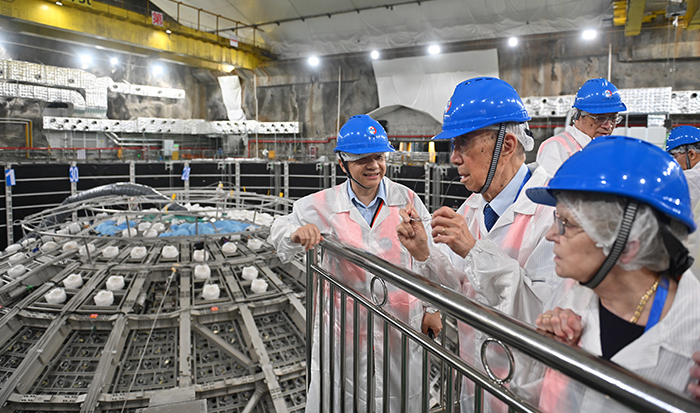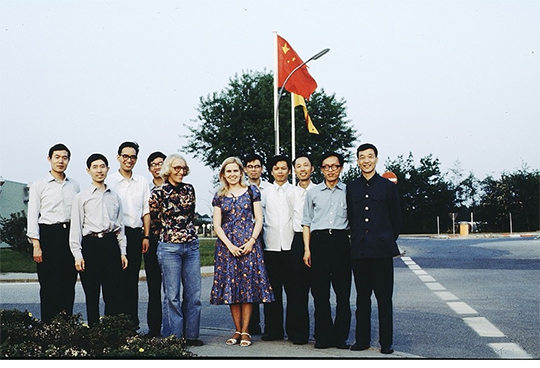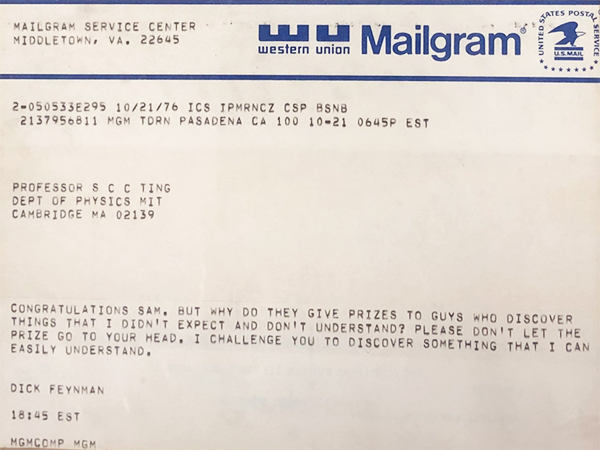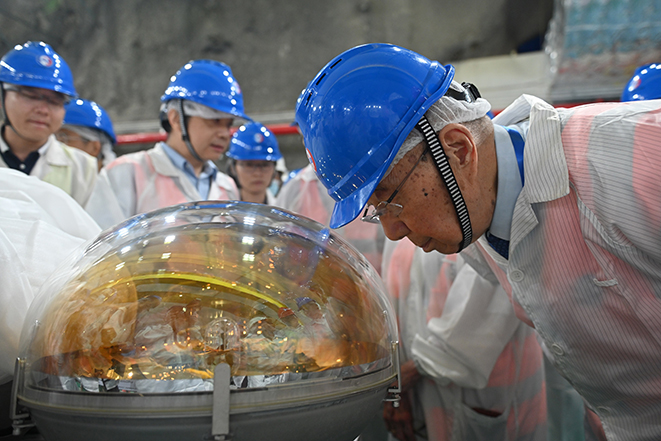– An open talk with Academicians C. C. Ting and WANG Yifang*
Question (Q): Why did you choose to study high energy physics in the first instance?
WANG Yifang (WANG): It was not me who made the choice, but Prof. Ting (laugh). I studied high energy physics because he picked me to join his group.
C. C. Ting (Ting): I went to University of Michigan after graduation from high school. I was born in the State of Michigan 20 years before, actually. At first, I studied mechanical engineering. At that time Chinese students tended to study engineering, as it would be easier to get a job (with a degree in engineering). I just followed suit without knowing what engineering meant. One year later, my tutor Robert R. White, then a very famous engineer in the United States, had an interview with me. He took a glance at my transcript and asserted: “You should not have taken engineering.” It was a time when we did not have computers. When you described an object, you had to give its top, upward, and side views to make a blueprint. I could not even manage to draw a line straight. My tutor advised me stop studying engineering as soon as possible. After another glance at my transcript for scores of other subjects, he concluded that physics would be my best major, and mathematics would also be a good choice. At the same time, he said that I should skip undergraduate courses and go directly to postgraduate school. I therefore went to see and talk to my mother, who was then in New York. She remarked that only those who were particularly intelligent could deal with physics. In other words, physics was not for me (smile). She did not say so explicitly, as she majored in psychology. I replied to her that I would love to take what I like the most, since my life has only once. I thereafter began to study physics.
Q: How should junior researchers choose science disciplines as their decade-long or even lifetime pursuit?
WANG: I think the first to consider is your own interests, of course. Follow your heart and choose what you really like. Sometimes, particularly in the case you do not yet know in the first instance, you might run into difficulties. This was what I experienced in my early days, as I did not learn high energy physics at first. Once taken, however, I loved it very much, and hence have stuck to it ever since. Therefore, the key point is, you love it. Whenever you find that you do not really like it, make the change, quickly.
Ting: I totally agree with Director WANG.
Q: Would you share with us your opinions on the influence of AI tools like ChatGPT on physics research? With such AI tools coming, should we shift our attention from fundamental physics and mathematics in our study, to focus on the use of AI tools?
WANG: In fact, I would expect the contrary: with such AI tools developing, we as humans will most probably be valued as “useful” exactly due to our understanding of fundamental physics and mathematics, including their fundamental principles, their logic, as well as their reasoning and proving. All these, at least for the time being, are beyond the reach of AI. AI is mainly adept at information collection; it might be able to do some reasoning based on what it has collected, but this reasoning should be subject to human beings’ verification. Obviously, it is impossible to do research by totally relying on AI. In the future, jobs that do not involve too much human intelligence but merely accumulation of knowledge might gradually disappear; yet human researchers, who are good at math and physics with understanding of fundamental science principles, will find their own future, because they are able to blaze new trails and make innovations. Therefore, I would say in a world with ChatGPT, the importance of physics and mathematics will become even more prominent.
Ting: Many physical laws change with time. Even the most powerful computer would not have been able to figure out Newton’s first, second or third laws. Similarly, however powerful a computer is, it would not be able to propose quantum mechanics or the theory of relativity. Yes, computers are very useful – just as Academician WANG said, they can take over a large share of workload on computing that would otherwise overwhelm human beings. When coming to breakthroughs, however, I cannot image how computers can do. They were designed based on existing principles, whereas physics is advanced by overthrowing existing principles.
Q: You once said that for an experiment, it is more important to subvert a theory than to verify one. Would you explain this?
Ting: Verifying a theory with experiments would not make a big difference in physics. At most, it would just let us know that the theory holds water. However, we will not be able to go forward unless we know there is a problem. Now there have been discussions about constructing a big accelerator in China, about which I’ve talked with Academician WANG for many times. The reason to build this large collider, I would say, is to pursue something unimaginable. Why do we need it anyway, if everything is predictable?
Q: There are different approaches doing research. Some physicists prefer to purchase state-of-the-art apparatuses to start their experiments quickly; while some prefer to design and build their own apparatuses based on their own ideas and study strategies. Both can produce excellent results. How would you comment on these two different philosophies and approaches?
WANG: Following Academician Ting’s experiences over the past decades, the answer, from my view, is very clear. The reason why he could earn great achievements and make fundamentally important breakthroughs at a very young age, is that he has unique ideas about the capabilities, performances, properties and parameters of the apparatuses. Only when your ideas are distinctive, can you make a difference. Using existing apparatuses, you can only make moderate breakthroughs or innovations. That is the difference. The reason why he could discover the J-particle, is exactly because his sharp insights in apparatus design and research ideas have never been conceived by previous physicists. This has naturally sent him somewhere never imagined by others. Therefore, for researchers in the field of high energy physics, the most important is a thorough understanding of apparatuses, as well as an excellent ability to design experimental devices in line with your own science objectives. Ultimately this will help you achieve some more ground-breaking results, in comparison with others. In my opinion, the latter approach could be more important, either for the researchers themselves or for the nation’s buildup of independent R&D of innovative apparatuses. So be the future performance in research ability development, for the physicists themselves or the nation alike. It follows that we shall never give up on building by ourselves experimental devices, in that it is a peculiar character inherent to high energy physics.
Ting: I would like to give you an example. When I was developing the apparatus for the AMS experiment, most, if not all, physicists doubted my ability. “No one has ever done this,” they said, “as it is way too difficult.” “You have never attended any space-based experiment; rather, all your experiences have been on ground-based accelerators. You know nothing about space, as you have never been there. You have no ability in this field.” To all these skeptical voices, I just replied: “That is exactly why I want to do this.”
I did the AMS-01 experiment. We flew the apparatus on a space shuttle, and everyone was happy after four days’ safe, stable operation in space. Then I proceeded to talk with NASA’s Administrator. Now the first step turned out to be fine, and it was time to think about what to do next, I proposed. The next step, my idea was, to abandon all the apparatuses used in AMS-01. The reason was, we knew the physics principle already. Therefore, the experimental device, the normal permanent magnet used in the first experiment, should be discarded and replaced with a superconducting one. To fly and maintain a superconducting magnet in space is extremely difficult, so difficult that it is beyond anyone’s imagination; and it demands an utterly different supportive system that would require a redesign of the whole device. The Administrator said he could imagine the difficulty resulting from the involvement of a superconducting magnet, but it might prove very useful for the later manned flights to Mars.
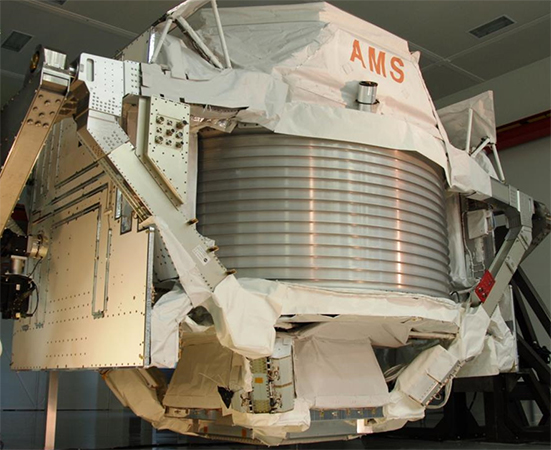
The detector of the AMS experiment, with a permanent magnet. (Credit: CERN)
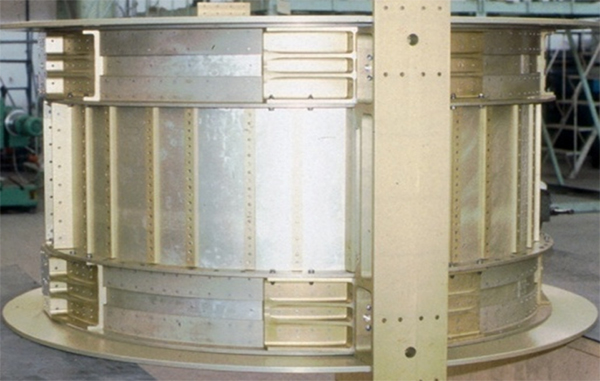
A lateral view of the permanent magnet used in the AMS experiment. (Image credit: IHEP)
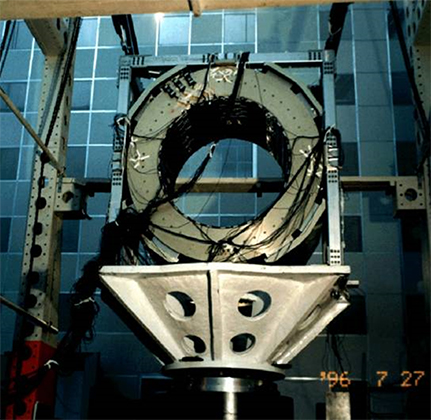
The permanent magnet for AMS under vibration test at ESA. (Image credit: IHEP)
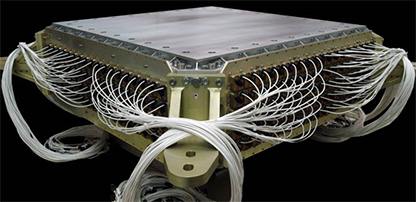
The electromagnetic calorimeter of MAS-02 (Image credit: IHEP)
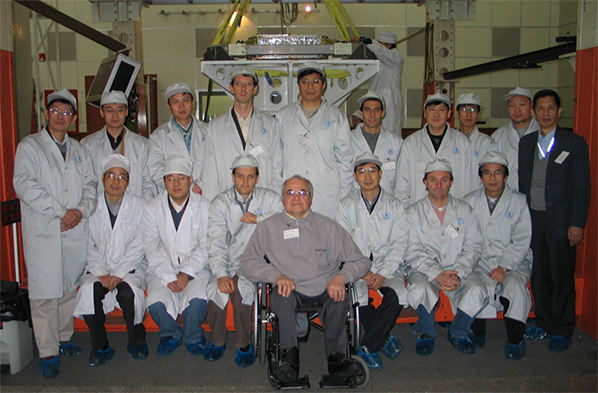
The science team in charge of the space-environment experiment for the electromagnetic calorimeter of MAS-02. (Image credit: IHEP)
Then Elon Musk came to the lab, and spent one afternoon to understand how to make a superconducting magnet work. It was really difficult. Eventually it was done, and the whole device set was installed, with all the old instruments used in AMS-01 replaced with the most state-of-the-art ones. Then we put the new set of devices in the accelerator of the European Center for Nuclear Research (CERN) to get calibrated. After the calibration, it was moved to the lab of space environment of European Space Agency (ESA) for a vibration test. When it was under test in the vacuum chamber on the day of April 16 in 2010 – I remember this very clearly – all of a sudden, NASA declared it would stop flying the space shuttles. The one to carry our AMS-02 would be the last one to fly, as it was previously approved by Congress. I had to think about the consequences. What should we do? Operating a superconducting magnet would make necessary shipping and refills of liquid helium for the superconducting magnet, unless it would only last for three years. The absence of space shuttles would risk the shortage of liquid helium for its operation and cut its lifetime to merely three years in space. At last, I made an aggressive decision right on the afternoon of that day, not to use the superconducting magnet for AMS-02 anymore. By that point we had already spent a lot of money on the device, but we decided to give it up anyway. We turned back to the permanent magnet developed by China as first used in AMS-01, rebuilt the whole system, and reinstalled it.
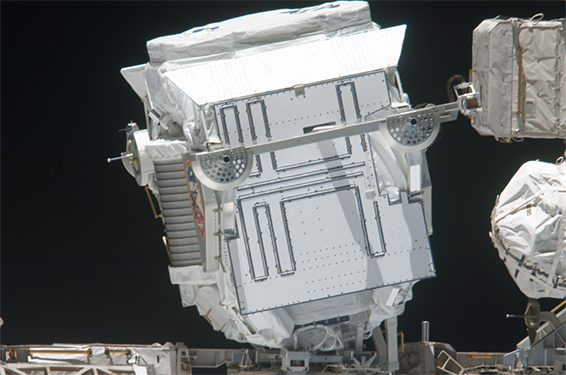
The device set of AMS-02 experiment as was just installed. To collect data in space for a time span as long as possible, Prof. Ting decided to replace the superconducting magnet with the normal permanent magnet previously used in AMS-01, which was developed by a Chinese team. (Credit: CERN)
For me, equipment is not the most important. The foremost thing is, you need to know your objective for the experiment. The instrument comes second to the science objective. As for the selection of instruments, just as Academician WANG mentioned, choose the most accurate. Do not care about factors of human beings – in other words, do not get scared in the face of difficulties, nor take notice of others’ objections.
Q: What has given you the determination to overcome all kinds of difficulties in experiments?
Ting: Once committed to experimental physics, you must take it as the most important thing in your lifetime. Whatever else is minor. Unless it would not be meaningful doing physics.
Q: What has impressed you the most in your five-decade experiences of cooperation with Chinese scientists?
Ting: China has very smart physicists who are very capable of doing research. This is natural, given China’s long history of culture for thousands of years, and its population as big as a fifth of the world’s total, there must be excellent scientists. Isn’t that simple statistics? Questioning is needless.
The first group of Chinese scientists to join Prof. C. C. Ting’s Mark-J experiment at the Deutsches Elektronen-Synchrotron (DESY) in Germany. (Image taken by Samuel C.C. Ting)
(*Note: Ting’s answer here is an extension of his impression of Chinese physicists as given at the end of his lecture “From Accelerators to Space” before the talk. “China boasts a lot of world-class experimental physicists. They are imaginative, capable, and well-experienced in R&D of advanced technologies and international cooperative research. They are competent for the most cutting-edge experimental physics and will keep making important contributions to human knowledge.”)
Q: What are you expecting of future high energy physics?
Ting: Right this morning, I repeated what Richard Feynman said to me again: Please don’t let the prize go to your head. I have shown you his letter of congratulations to me in my lecture. That is why I generally do not comment on things that I do not understand. But I do understand accelerators a little bit, because I spent all my life working on them. From my point of view, building a big accelerator will be an inevitable and very important project as the next step. Yes, there are debates and discussions which are all natural. Human beings are curious and will go forward in the end. If you do not do this in China, other peoples will do it anyway. In that case, you will be lagged behind as a follower.
“Please don’t let the prize go to your head.” Academician Ting repeated the quote from the congratulatory letter by Nobel laureate Richard Feynman, a friend of his, at his lecture and his dialogue with the audiences at IHEP. (Image by courtesy of Samuel C. C. Ting)
Q: What has international S&T cooperation brought to China
WANG: I would say, at least in the field of high energy physics, China has benefited from international S&T cooperation. Such collaborations have immersed the involved Chinese scientists into the international research context at the quickest rate, working hand-in-hand with their international colleagues. Put in such circumstances, we had to learn as quickly as possible to catch up with our international colleagues, otherwise it would be impossible to work together with them. The first Chinese scientists to work on international projects, say, those who had the privilege to work with Academician Ting’s Mark-J team, grasped the methods, technologies and philosophy of high energy physics very fast.
Therefore, the first, as well as the second group of Chinese physicists led by Prof. Ting in the Mark-J experiment have actually become the backbone of the experiment, called BES, on the Beijing Electron Positron Collider (BEPC). The experiment of Mark-J has helped train personnel for every sub-system of the BES experiment. Probably, Academician Ting has intendedly positioned them in different areas, thus covering every aspect involved in experimental high energy physics. This has made it easier for us to build the BEPC and BES. Of course, the success of BEPC has also benefited from the cooperation with the five national laboratories of the US.
The subsequent progress of high energy physics has also incorporated with large-scale international cooperation, just as we can see in the Daya Bay and the JUNO (Jiangmen Underground Neutrino Observatory) experiments. The contribution from international partners can account for about 20%, and even up to 50% of the total investments. Such international cooperation has made our personnel, technological buildup, and the ultimate results, all comparable to those of our international colleagues. Naturally, in the future, our projects will also follow this model. After all, the advancement of science, I would say, requires the participation of the whole humanity; and this is also the shared objective and ideal of the whole humanity.
Ting: I agree with Academician WANG. I would mention a special characteristic of international S&T cooperation here. An example of this is the SSC project, a huge accelerator called Superconducting Super Collider in the US. The circumference of this collider is about 86 kilometers, but it was canceled by Congress for poor management when it was just half-built. The USA was once a highland for international high energy physics. It had hence attracted a lot of talented physicists with its most effective research and well-established achievements. After the cancellation of SSC, some of the once cohesion of physicists traveled to China, some to CERN in Western Europe, and some to Japan. Now the USA does not count as the best of the world any more in high energy physics. The USA has invested a lot in CERN, which is a large international cooperative project. When it comes to output papers and important discoveries, for example the discovery of Higgs particle, people generally attribute it to CERN. This attribution is very traditional. Similarly, if China builds a big collider in cooperation with many countries, important discoveries made with this instrument will also be mainly attributed to China, because the collider is in China. Yes, the role played by international cooperation is important, but the location is also important. Once an important discovery is made at CERN, we would not say Greece contributed 9% and the UK 7% to the experiment; we just say the achievement has been made by CERN. It is important to take the initiative, in that China is not the smallest country in the world.
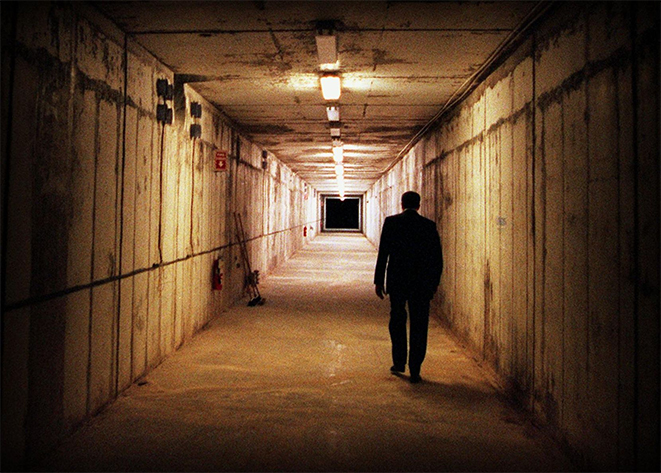
Texas General Land Office Facilities Manager J. Richard Fielder walks down the tunnel of the abandoned Superconducting Super Collider in 2005. (Photo by Louis DeLuca)
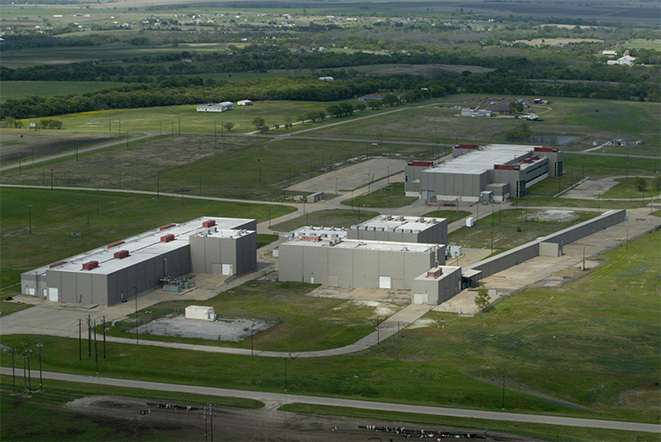
An aerial view of the Superconducting Super Collider site near FM1446 outside of Waxahachie. (Photo by Natalie Caudill)
Q: Does the participation of China contribute significantly to the world’s S&T development?
WANG: Looking at the field of high energy physics, we attended a lot of international experiments hosted by foreign countries, of course. There exist two types of international cooperation. One type is experiments hosted by other countries, and another type is experiments hosted by us. We attended a lot of experiments hosted by other countries, such as Belle II experiment in Japan, L3, ALEPH, and later the ATLAS, CMS, LHCb and ALICE experiments at CERN. Of course, as mentioned earlier we attended the Mark-J experiment at the Deutsches Elektronen-Synchrotron (DESY) in Germany. To be fair, at first, we made merely a little mediocre contribution; and after decades of development, we are now making visible contributions with more significance. Just as emphasized by Prof. Ting, all these are experiments dominated by other countries. Although we made some important contributions, they are not the most important ones, nor did they make the primary contributions. When a great discovery is made, we might not be considered as a major contributor. Therefore, we hope that we eventually have the opportunity to host international experiments at home. Only in that way can we have the initiative to make major discoveries. On the other hand, we did make visible contributions to science advancement of the world via our efforts in the past international cooperative experiments; in the future we will continue to work in this direction. To put it simple, we will stick to both models, with more emphasis placed on hosting large cooperative experiments at home.
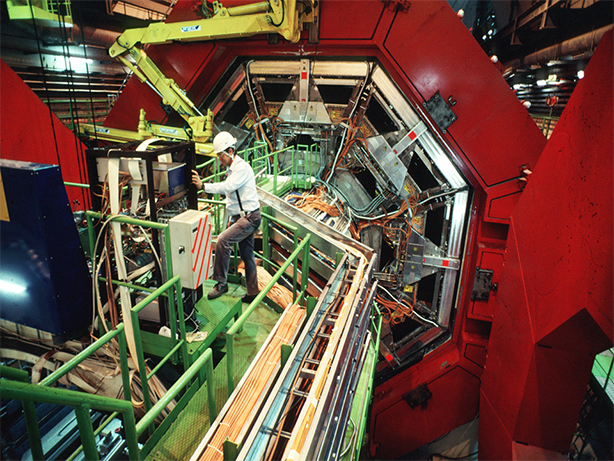
The L3 experiment, one of the four large detectors on the Large Electron-Positron (LEP) collider at CERN. IHEP is a partner of this international project. (Image credit: IHEP)
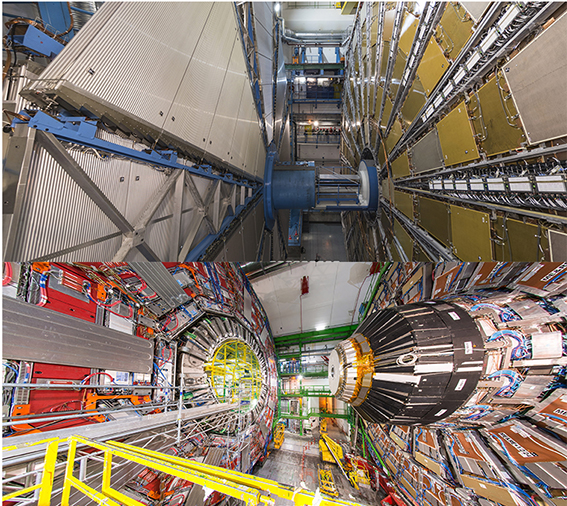
ATLAS and CMS experiments conducted at CERN that successfully detected the Higgs boson in 2012, are among the internationally cooperated projects participated by IHEP. Shown here are their detectors. Up: ATLAS; Bottom: CMS. (Images: CERN)
Q: Director WANG, how would you comment on Academician Ting, your mentor and supervisor?
Ting: He is not a pupil, but a colleague of mine.
WANG: It is not so appropriate to comment on my mentor in his presence, right (smile)? Certainly, it is not good to speak unpleasant words; even compliments are not always suitable. Anyway, needless to say, I learned a lot from Academician Ting. Actually, joining his L3 experiment marked the beginning of my career in high energy physics. Working in his team, I had the opportunity to follow how the international cooperation was organized, how the scientific research was conducted, how to cooperate with colleagues, how to choose the most important topics, and how to overcome difficulties. From a broader perspective, I even learned how to choose a large-scale experiment.
Personally, I still remember in the later stage of the L3 experiment, Academician Ting considered many different options concerning his next project. Finally, he decided to take AMS. I had the privilege to witness the whole process from the very beginning to the end. No more than 10 people in the world had this privilege to behold the process. I learned a lot from this, particularly about what is the most important. Just as Prof. Ting mentioned, it is inevitable to run into difficulties; but when choosing a project which you are going to pursue in the following 20 or 30 years, the most important thing to consider is its scientific merit, not difficulties. Because you have little chance to change your life during these 20 or 30 years, nor can you live this timespan a second time – you should not regret your choice.
So, I think Academician Ting has shown us a role model. Once he entered a brand-new area, for example space experiment, he met with lots of difficulties. As we just heard, people doubted that he could do the experiment well, since he had never participated in any space experiment before. Difficulties are infinite, of course, but the first and foremost thing to consider is science, its significance in science. As long as it is correct in terms of science, other issues, finance or personnel alike, will be sorted out anyway. The needed resources will follow the science project, rather than the reverse, people and projects follow resources. In that case, we would have put the cart before the horse.
Q: Academician Ting, how would you comment on your former student WANG Yifang? You do not take him as a student, but a colleague of yours. If so, what kind of a colleague do you think he is?
WANG: This is not correct. I joined Prof. Ting’s L3 experiment immediately after my graduation from college. It was the first research I ever conducted, and he has been my mentor since then.
Ting: I would say every person is unique. Some people have made their success by choosing good parents, some by choosing a good topic to pursue. And how to choose a good topic, just as what Academician WANG said, is of the foremost importance. His most prominent characteristic is his good taste in topics. That is of the most importance for science research. Other things, like instruments, are also important too, but what is of the most importance is the objective. Only when you have an objective can you have collaborators to join you. When you are organizing a large-scale international cooperative project, the reason why German, British or French scientists are willing to join you, mainly lies in their common interest in the science issue itself, rather than anything else.
Academician C. C. Ting on his visit to the site of JUNO, the Jiangmen Underground Neutrino Observatory, together with Prof. WANG Yifang, Member of CAS. (Image credit: IHEP)
Q: What would you say to the young people of today, Academician Ting?
Ting: When I began to study physics, my family objected to my choice. Even my mother did not agree with me. However, my idea is, a person has only one lifetime; therefore, you must choose what you like the most. Personally, physics is the most important thing for me, while whatever else would be less important. You might ask why I am not retiring now. According to the pension system in the US, my annual income would be a few times more than what I earn now if I chose to retire; but in that case my life would become meaningless. I would not be able to oversee a physical experiment then. I am just keen on physics; therefore, I love doing experiments. Now I generally get up at about 7 o’clock in the morning, and work until 7 or 8 o’clock in the evening. Very importantly, Susan (pointing to his wife) supports me steadily. (To Susan: And you happily allowed.)
Q: What would you say to the young people of today, Academician WANG?
WANG: Now, of course also in the future, young people in particular, might meet with a lot of difficulties and sometimes become very confused. In my opinion, our objective is very clear, however. The problem is just that you might not be confident enough about your ability to overcome current difficulties. I would say we shall be optimistic about our future. Actually, the process of overcoming difficulties itself is quite enjoyable. Therefore, I hope you stick to your objectives, and head to your chosen goals, without fear or hesitation.
(Translated by SONG Jianlan)
